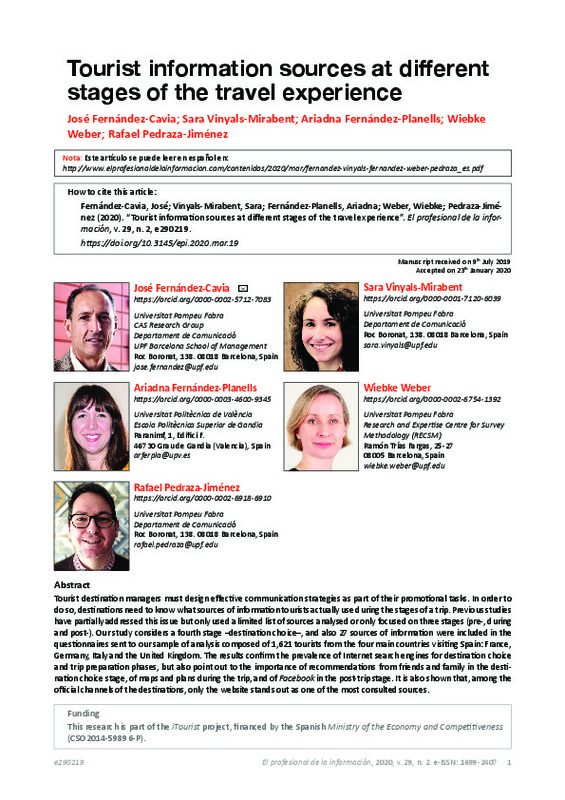JavaScript is disabled for your browser. Some features of this site may not work without it.
Buscar en RiuNet
Listar
Mi cuenta
Estadísticas
Ayuda RiuNet
Admin. UPV
Tourist information sources at different stages of the travel experience
Mostrar el registro sencillo del ítem
Ficheros en el ítem
| dc.contributor.author | Fernández-Cavia, José
|
es_ES |
| dc.contributor.author | Vinyals-Mirabent, Sara
|
es_ES |
| dc.contributor.author | Fernandez-Planells, Ariadna
|
es_ES |
| dc.contributor.author | Weber, Wiebke
|
es_ES |
| dc.contributor.author | Pedraza-Jiménez, Rafael
|
es_ES |
| dc.date.accessioned | 2020-11-26T04:32:23Z | |
| dc.date.available | 2020-11-26T04:32:23Z | |
| dc.date.issued | 2020-04 | es_ES |
| dc.identifier.issn | 1386-6710 | es_ES |
| dc.identifier.uri | http://hdl.handle.net/10251/155860 | |
| dc.description.abstract | [EN] Tourist destination managers must design effective communication strategies as part of their promotional tasks. In order to do so, destinations need to know what sources of information tourists actually use during the stages of a trip. Previous studies have partially addressed this issue but only used a limited list of sources analysed or only focused on three stages (pre-, during and post-). Our study considers a fourth stage -destination choice-, and also 27 sources of information were included in the questionnaires sent to our sample of analysis composed of 1,621 tourists from the four main countries visiting Spain: France, Germany, Italy and the United Kingdom. The results confirm the prevalence of Internet search engines for destination choice and trip preparation phases, but also point out to the importance of recommendations from friends and family in the destination choice stage, of maps and plans during the trip, and of Facebook in the post-trip stage. It is also shown that, among the official channels of the destinations, only the website stands out as one of the most consulted sources. | es_ES |
| dc.description.abstract | [ES] Los gestores de los destinos turísticos, entre sus labores de promoción, deben diseñar estrategias de comunicación eficaces. Para ello necesitan conocer qué fuentes de información utilizan realmente los turistas en las diferentes etapas del viaje. Estudios anteriores han abordado este tema, pero analizando un número muy limitado de fuentes y contemplando solo los hábitos informacionales en las tres etapas clásicas del viaje (antes, durante y después). Nuestro trabajo realiza una encuesta en la que se incluye una cuarta etapa, previa, de selección del destino. Se ha hecho una consulta sobre el uso de 27 fuentes de información a una muestra de 1.621 turistas, representativa de los cuatro mercados emisores principales de España: Alemania, Francia, Italia y Reino Unido. Los resultados confirman la importancia de los buscadores de internet en las fases de selección del destino y de preparación del viaje, pero señalan también la importancia de las recomendaciones de amigos y familiares en la fase de selección, de mapas y planos en la fase de realización del viaje y de Facebook en la fase posterior al viaje. También se demuestra que, entre los canales oficiales de los destinos, únicamente la web se encuentra entre las fuentes más consultadas. | es_ES |
| dc.description.sponsorship | This research is part of the iTourist project, financed by the Spanish Ministry of the Economy and Competitiveness (CSO2014-59896-P). | es_ES |
| dc.language | Inglés | es_ES |
| dc.publisher | Ediciones Profesionales de la Informacion SL | es_ES |
| dc.relation.ispartof | El profesional de la información | es_ES |
| dc.rights | Reserva de todos los derechos | es_ES |
| dc.subject | Tourism | es_ES |
| dc.subject | Tourist destinations | es_ES |
| dc.subject | Tourists | es_ES |
| dc.subject | Habits | es_ES |
| dc.subject | Destination marketing organizations | es_ES |
| dc.subject | Webs | es_ES |
| dc.subject | Social networks | es_ES |
| dc.subject | Social media | es_ES |
| dc.subject | Search engines | es_ES |
| dc.subject | Information sources | es_ES |
| dc.subject | Information search | es_ES |
| dc.subject | Information seeking | es_ES |
| dc.subject | Maps | es_ES |
| dc.subject | es_ES | |
| dc.subject | Turismo | es_ES |
| dc.subject | Destinos turísticos | es_ES |
| dc.subject | Turistas | es_ES |
| dc.subject | Hábitos | es_ES |
| dc.subject | Organizaciones de marketing de destino | es_ES |
| dc.subject | Medios sociales | es_ES |
| dc.subject | Redes sociales | es_ES |
| dc.subject | Motores de búsqueda | es_ES |
| dc.subject | Fuentes de información | es_ES |
| dc.subject | Búsqueda de información | es_ES |
| dc.subject | Mapas | es_ES |
| dc.subject.classification | COMUNICACION AUDIOVISUAL Y PUBLICIDAD | es_ES |
| dc.title | Tourist information sources at different stages of the travel experience | es_ES |
| dc.title.alternative | Fuentes de información para los turistas en las distintas etapas del viaje | es_ES |
| dc.type | Artículo | es_ES |
| dc.identifier.doi | 10.3145/epi.2020.mar.19 | es_ES |
| dc.relation.projectID | info:eu-repo/grantAgreement/MINECO//CSO2014-59896-P/ES/L TURISTA EN LA WEB: HABITOS INFORMACIONALES Y SELECCION DE DESTINO TURISTICO/ | es_ES |
| dc.rights.accessRights | Abierto | es_ES |
| dc.contributor.affiliation | Universitat Politècnica de València. Departamento de Comunicación Audiovisual, Documentación e Historia del Arte - Departament de Comunicació Audiovisual, Documentació i Història de l'Art | es_ES |
| dc.description.bibliographicCitation | Fernández-Cavia, J.; Vinyals-Mirabent, S.; Fernandez-Planells, A.; Weber, W.; Pedraza-Jiménez, R. (2020). Tourist information sources at different stages of the travel experience. El profesional de la información. 29(2):1-12. https://doi.org/10.3145/epi.2020.mar.19 | es_ES |
| dc.description.accrualMethod | S | es_ES |
| dc.relation.publisherversion | https://doi.org/10.3145/epi.2020.mar.19 | es_ES |
| dc.description.upvformatpinicio | 1 | es_ES |
| dc.description.upvformatpfin | 12 | es_ES |
| dc.type.version | info:eu-repo/semantics/publishedVersion | es_ES |
| dc.description.volume | 29 | es_ES |
| dc.description.issue | 2 | es_ES |
| dc.relation.pasarela | S\410062 | es_ES |
| dc.contributor.funder | Ministerio de Economía y Competitividad | es_ES |








